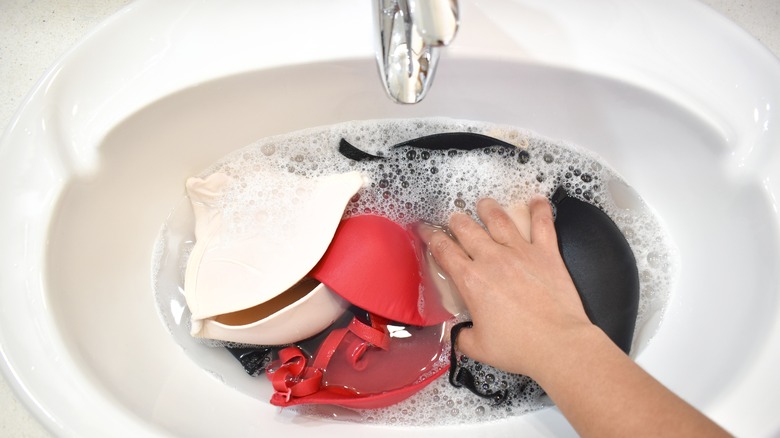Over-Washing Your Clothes May Be Putting Your Sustainability Efforts To Shame
We may receive a commission on purchases made from links.
If you want to get the most mileage out of every piece in your wardrobe, you might want to start by not over-washing them. That's right — you could be doing too much laundry and canceling out your sustainability efforts. According to Levi's vice president Paul Dillinger, "Changing our home laundry routine is one of the biggest opportunities for resource conservation," he explained to Vogue. "It's also an incredibly easy solution: we're just asking people to not do their laundry."
Laundry is an essential and effective solution to keeping our clothes clean, but overdoing it may result in a higher carbon footprint and over-washed, worn-out clothes that need to be replaced more often — adding to landfills unnecessarily. For example, to really up your sustainability efforts, jeans should be worn at least 10 times before they're sent to the laundry hamper, and more precious materials like wool should be treated with a spot cleaner or steamer. In fact, Dr. Kyle Grant, CEO of eco-friendly laundry company Oxwash emphasized to Vogue that, "Wool has some unique characteristics that contribute to its ability to resist dirt and odor — it can be spot cleaned, aired and/or steamed with an iron to get the shape back."
Not only should laundry be done less frequently, there are also eco-friendly alternatives to clean clothing that don't necessarily require a wash cycle. If you're looking to reduce your carbon footprint and curtail your laundering habits, we've got you covered.
It's better to hand wash bras
In addition to wool materials, bras are another piece of clothing that's highly overwashed. Drying your bras are a problem as well because the hooks can get caught in the dryer, and the heat can ruin the elasticity, making your bras more susceptible to breakage. While many bra-wearers have joined the movement to free themselves by going braless, others who choose to wear bras will continue having to buy more if they throw their bras in the dryer.
It's best to wash your bras by hand instead, and there are many tips to ensure the most effective hand-washing techniques, like spot-treating stains, using cool water, and leaving them out to air dry. They're called delicates for a reason — they should be treated and cleaned with a gentle hand. Ideally, two to three wears is enough time to wait in between washes. As stated by the director of fit at Cuup, Tania Garcia, "When hand-washing your bras, stay away from harsh detergents and intense lathering or rinsing," she explained to CNN. "Instead, opt for a delicate detergent and gently handle your bras to avoid materials from stretching and reshaping."
Opt for low temperatures and an eco-friendly detergent
Even though setting your dryer temp to its highest setting may help your clothes dry more quickly, low temperatures are best for sustainable laundering. Air-dryer is ideal for the optimal eco-friendly method, but if you must use the dryer, the American Council for an Energy Efficient Economy suggests either using the lowest temp or the "less dry" setting. You should also dry as many loads in a row as possible in order to take advantage of the retained heat and add another spin cycle when washing your clothes in order to get them as dry as possible. In addition, an environmentally friendly detergent should be used during the wash, like Tide Purclean ($13) or Seventh Generation Free & Clear ($22). It's best to avoid harsh and toxic ingredients like phosphates, dyes, and formaldehyde.
As Dr. Kyle Grant explained to Vogue, "Many laundry detergents contain chemicals, such as phosphates, surfactants, and optical brighteners, which can be harmful to aquatic life when they enter waterways through wastewater discharge." The water we use to wash our clothes cycles on beyond our laundry, forcing underwater life to swallow toxic chemicals. Don't forget that every environmentally harmful action causes a chain reaction!
Avoid microplastics from synthetic clothing
Doing excessive loads of laundry causes what is known as microfiber pollution, or the fibers that shed from synthetic clothing and send small plastic bits into the air and different waterways, per The New York Times. Microfibers are also the most common microplastic found in our environment and oceans, and are incredibly harmful to aquatic life. When it comes time to do your laundry, investing in a microplastics filter can help catch some of the stray microfibers. Ideally, however, synthetic clothes should be avoided altogether when doing laundry.
There are a multitude of reasons why curtailing your laundry habits can be better for not only you and your clothes but for the environment as well. In a time when fashion footprint calculators are showing us the impact of our habits, examining how we treat and care for our clothes is just as important. From energy saving, carbon reduction, and water conservation, we hope you'll take a closer look at how you can improve your sustainability efforts.



